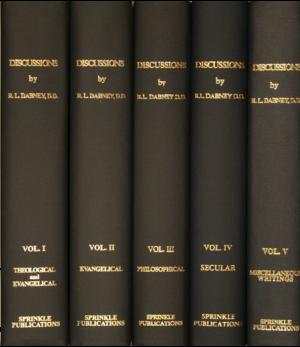
The great Southern Presbyterian theologian Robert Lewis Dabney has been mentioned a number of times on this site. It is a very telling indication of our times that such a visionary man is so little known, and usually slandered when mentioned at all. You can find the entire collection of his written works at the Dabney Archive, all of which are well worth reading. However, such a massive undertaking can be a bit overwhelming, and so on Sundays I have begun posting bite-sized excerpts from Dabney’s works with perhaps a little bit of my own commentary. This will be done in hopes of promoting wider readership for this great man. You can find links to all the previous “Dabney on Sunday” posts at the bottom of this post.
The following excerpt is taken from an article Dabney wrote for the Presbyterial Critic, published in July 1855 and entitled “The Gospel Idea of Preaching.”
From the days of Enoch, who prophesied (Jude 13), and of Noah, who was a preacher of righteousness (2 Peter 2:5), to our day, God has employed “the foolishness of preaching to save them that believe.” To us who hold that “the Bible, and the Bible alone, is the religion of Protestants.” both the warrant for preaching, as a religious ordinance, and the model for its performance, must be given from the word of God. The patriarchs, the prophets, probably the Aaronic priests and the pious kings, preached to Israel. But the first full description of the nature of the exercise is the oft-cited passage from Nehemiah 8:1-8, when Ezra and his associates “read in the book of the law of God distinctly, and gave the sense, and caused them to understand the reading.” Here we have the true scriptural idea of the preacher’s function: to make the people understand what is in God’s word. The Christian minister’s commission is in these words: ” Preach the word; (herald the word) be instant in season, out of season; reprove, rebuke, exhort, with all longsuffering and doctrine.” (2 Tim. 4:2.) The object of preaching is the salvation of the soul; and that salvation consists in a redemption from the guilt, love, and practice of iniquity. The instrument of this redemption is God’s truth, as he has revealed it. “Sanctify them through thy truth.” The preacher is most explicitly called a herald; that is, the deliverer of a message. Now, the herald does not make his message, he merely transmits it. He has nothing to do with judging its wisdom or fitness; let him simply proclaim it as it is given to him. This was God’s command to an ancient preacher: “Arise, go unto Nineveh, that great city, and preach unto it the preaching that I bid thee.” (Jonah 3:2)
Or, the preacher’s office may be illustrated by the work of one who uses a die put into his hands, to form impressions on some plastic substance. The sinful soul is that substance. The word of God is the die; and the divine image of knowledge and true holiness is the impression to be formed. God, who made man’s soul, and therefore knows it made the die; and of course he best knew how to make it, to produce the impression he desired. Now, the workman’s business is not to criticize, re-carve, or altar the die which is committed to him, but simply to press it down upon the substance to be shaped. In this view, how plain is it that all preaching must be accurately representative of Bible truth, and in Bible proportions? Else it is not God’s work. The preacher’s business is simply to take what he finds in the Scriptures, and as he finds it, and press it down upon the understandings, hearts, and consciences of men. Nothing else is his business as a preacher. The die is just so sharp and hard, so large and so perfect as God would have it. He judged it was the right die to produce the impression he intends. This is enough for us. Here we have a few obvious truths which none will dispute who are known as evangelical Christians. But if we are not mistaken, they contain the following deductions, by which many things very prevalent in the practice of persons considering themselves evangelical are condemned.
Not only must Bible topics form the whole subject matter of preaching, but they must be presented in scriptural aspects and proportions. God made the Bible for the people; not raw material which the religious philosopher is to work over into new forms. Here is a simple and admitted fact, which is full of neglected inferences. The book of God is not like the book of creation, a mixed and crude mass of the ore of knowledge, which must become the subject of scientific re-arrangement, to become intelligible to common minds. The Bible is for the people; this is the great principle of Protestants. And this implies that God, who knew best, has set forth the truth he purposed to apply in such forms and aspects as he knew would best suit the human mind. There can be no other forms of presentation so suitable to the people, because God has chosen these. “The preacher’s business is just to show the people what is in the Bible,” as God has there set it forth.
In parts 2 and 3, Dabney will address whether or not issues of the day may be addressed from the pulpit and what method the preacher should use in his preaching.
Previous Dabney on Sundays:
Universal Suffrage
Abstractions
Redefining Terms
False Philosophies
Abolishing Religion
Cruelty of Humanitarian Philanthropy
Southern Slavery
Labor Unions
Secularized Education
Patriotism
| Tweet |
|
|
|




